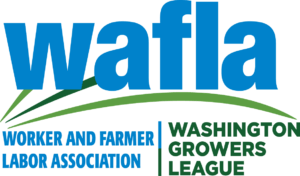'We can’t get enough domestic workers to work seasonally': H2A visa explained

'We can’t get enough domestic workers to work seasonally': H2A visa explained
The Register-Guard of Eugene, Ore.
Nov. 15, 2022, by Shannon Sollitt, Salem Statesman Journal
Hop farmer Jen Coleman was nervous about using H2A workers. The visa program allows agricultural employers to hire temporary, seasonal workers from other countries during peak seasons such as harvest.
The program comes with costs to farmers: housing, wages, paperwork and application fees. So Coleman had reservations. But she “fell in love” with her team of employees “as soon as they got here.”
That was in 2016. Coleman hired 28 H2A workers from Mexico. Now, she hires more than 100 temporary workers from September through October to harvest hops at her family’s three properties in Mt. Angel, St. Paul and Independence.
To qualify for H2A workers, employers must prove they cannot fill open positions with domestic workers. Farmers like Coleman say it provides critical staffing for jobs they cannot otherwise fill.
“We can’t get enough domestic workers to work seasonally,” Coleman said.
The visa program has taken off in neighboring California and Washington. The Department of Labor certified more than 300,000 seasonal agricultural jobs for H2A workers in 2021. Close to 30,000 of those jobs were in Washington.
Oregon certified roughly 5,000 H2A jobs in 2021. But farmers and H2A recruiters suspect a labor shortage will continue to drive the need for foreign workers in Oregon.
A conference hosted in Salem this month allowed Oregon farmers to ask questions about the visa program. The summit was hosted by Wafla, a membership organization that supplies Pacific Northwest farms with H2A workers and resources.
The Statesman Journal attended the conference to get answers to some commonly-asked questions about the visa program.
What is an H2A visa?
An H2A visa is a nonimmigrant temporary work visa for agricultural employees. Visa holders can live and work in the United States for up to three consecutive years before they must return to their home country for at least 90 days. Many workers return to the same farms each year.
Who is eligible to hire H2A workers?
Agricultural employers can apply for H2A workers through the Department of Labor. Employers must prove that they cannot fill open positions with domestic workers and demonstrate the need for a specific number of H2A workers. An employer who has laid off a U.S. worker within 60 days of the date of need is not eligible to employ H2A workers. Employers must re-apply every season labor is needed.
How are H2A workers different from migrant seasonal workers?
Migrant seasonal workers – workers who travel to different worksites and states depending on the season – are protected by the Migrant and Seasonal Worker Protection Act. H2A workers are exempt. While migrant workers and H2A workers often work side-by-side, migrant seasonal workers are considered U.S. residents.
Are there rules to protect H2A workers, then?
H2A workers and their employers are regulated by Immigrant and Nationality Act. H2A employers are required to provide written work contracts to all H2A worker, in a language they can understand, by no later than their first day of work. Oregon H2A workers are protected by Oregon employment laws and practices, including Oregon Paid Family and Medical Leave and protected time off.
How much are H2A workers paid?
H2A workers are paid based on prevailing Adverse Effect Wage Rates (AEWR) or state or federal minimum wage. Employers are required to pay whichever rate is highest. AEWR is a weighted hourly rate for agricultural workers calculated by region based on USDA farm labor survey data. The rate is designed to protect the wages of domestic workers.
Farmers can pay a piece rate but must guarantee the rate is at least equal to the hourly AEWR. In Washington and Oregon, the Adverse Effect Wage Rate is $17.41 per hour.
Where do H2A workers live?
H2A employers are required to provide housing for every worker they employ at no cost to the worker. In Oregon, housing must be registered with Oregon OSHA no more than 45 days before the first day of occupancy. Housing must meet Oregon OSHA’s safety standards for farmworker housing. Employers are also required to provide certain supplies, including hand soap, trash cans with lids and kitchen utensils upon arrival.
Employers can choose to house workers in hotels or motels as long as the rooms meet OSHA standards for temporary labor camps.
Employers must also reimburse or provide travel from the workers’ home countries.
Will H2A workers be eligible for overtime pay?
Yes. Agricultural employees in Oregon, including H2A workers, will be eligible for overtime beginning in January 2023. Farmworker overtime will take effect in phases over five years. Employers will be required to pay farmworkers overtime for any hours worked past 55 hours a week in 2023 and 2024. By 2027, employers will be required to pay overtime for any hours worked past 40 in a week.
